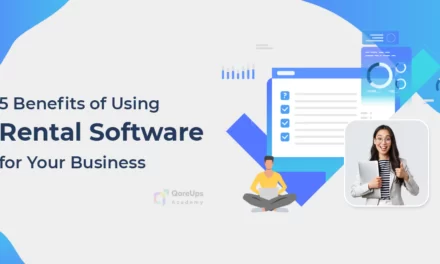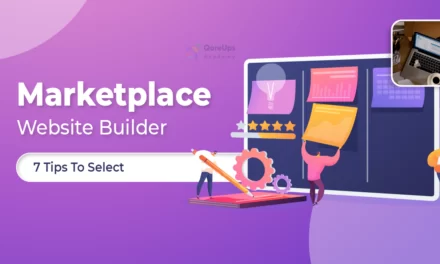Recent years have seen a surge in B2B businesses embracing digital trends, positioning themselves as primary online storefronts.
Within the realm of B2B, the rental marketplace sector has experienced particularly dynamic growth.
Statista reports that 36% of millennials reside in rental properties, underlining the significance of this market segment.
Notably, the popular online B2B rental marketplace Airbnb attracts a staggering 99.4 million visits to its platform.
Ensuring your online B2B rental marketplace is appealing to initial customers while maintaining long-term viability is crucial for sustained competitiveness.
Therefore, when you build rental marketplace, it’s imperative to incorporate essential features.
This blog caters specifically to B2B rental marketplace entrepreneurs seeking guidance on must-have platform features. Stay tuned to discover these vital components.
Before delving into feature specifics, it’s essential to understand…
What Is A Rental Marketplace?
A rental marketplace is an online platform that connects individuals or businesses who own items or properties with those looking to rent them.
This type of marketplace facilitates the exchange of rental services between two parties: the renters and the owners.
What is a Rental Platform?
A rental platform serves as an online hub connecting providers with renters.
Through this online marketplace software, users can lease various items advertised by individuals or businesses in exchange for a fee.
Items available for rent range from equipment and automobiles to furniture and real estate properties.
For example, the user-friendly nature of online B2B rental platforms has made them increasingly popular within the real estate market.
Consumers pay a service fee to access these online B2B rental platforms, which seamlessly facilitate connections between property owners and potential renters.
Property owners, in turn, pay a listing fee to advertise their rentals on these platforms.
With a clear understanding of the online B2B rental marketplace landscape, let’s now delve into its essential features.
10 Essential Online B2B Rental Marketplace Features
For any digital marketplace having a unique value proposition is necessary to find success.
However, popular marketplace platforms typically share numerous characteristics.
This is quite logical as users of a marketplace expect certain behaviors from it.
Reimagining basic functions can create unnecessary challenges since users may struggle to adapt to unfamiliar processes on your website.
Whether using a marketplace builder or starting from the ground up, make certain your platform incorporates all the features.
Here’s a compilation of the key essential features found in nearly all online B2B rental marketplaces.
Map & Location
In traditional marketplace platforms like Amazon and eBay, the location of the products doesn’t usually matter since they can be shipped anywhere.
However, the same cannot be said for online B2B rental marketplaces.
For example, in a vacation rental marketplace, specifying the address of the rental property is crucial.
Similarly, items such as cars, office space, construction equipment, or smaller items like cameras or baby gear typically require a specific location.
Having to wait for an item to be transported from a distant location can often be a deal-breaker because rental needs often arise suddenly.
Multi-Payment Option
Online payments
Most marketplaces generate revenue by taking a share of each transaction, making it imperative that payments occur through the online B2B rental platform.
Customers should have the option to use familiar payment methods such as PayPal, Stripe, or Razorpay accounts to make payments on your platform.
Before the provider of the rental item receives payment in their bank account, the marketplace owner must be able to collect their share.
Cash
Cash offers advantages by providing consumers with a sense of security regarding their purchases.
With cash in hand, consumers have immediate recourse if the received item doesn’t meet their expectations.
This eliminates the need for product complaints and refund requests.
In cases where the product quality is unsatisfactory, cash provides the flexibility to purchase from another vendor.
Also, if the order is incorrect for any reason, there is no financial loss incurred.
Moreover, consumers aren’t required to wait for the retailer to issue a refund or accept a replacement, simplifying the process and avoiding transaction cancellations.
Mobile Responsive
Websites for marketplaces that are optimized for mobile devices often experience a boost in the number of browsing consumers who convert into active users.
Companies and brands understand that inadequate mobile optimization can negatively impact their reputation.
When visitors access your marketplace website, poor navigation due to awkward design and subpar optimization can tarnish your online B2B rental platform’s branding.
Let’s see some advantages of responsive web design for your market and, crucially, for your users:
- Increased traffic on mobile devices.
- Faster and more cost-effective mobile development.
- Reduced maintenance requirements.
- Quicker loading of pages.
- Lower bounce rates.
- Higher conversion rates.
- Simplified analytics reporting.
Reviews
Renting out possessions to strangers can indeed be daunting, akin to the apprehension felt when booking vacation accommodations from an unknown individual for an extended period.
Successful rental marketplaces prioritize fostering an environment of trust among users. Reviews play a pivotal role in achieving this goal.
After a successful transaction, customers have the opportunity to review the provider.
This Review feature benefits both parties involved, helping to build trust and credibility within the marketplace community.
- For renters, having the assurance that they are working with sincere individuals enhances their trust in the rental market place.
- Providers, on the other hand, benefit from reviews by being able to establish trust with both existing and potential renters. Positive reviews not only help in building credibility but also serve as a tool to attract more renters to their offerings.
Availability and booking management
On your marketplace platform, the availability and booking management function serves three key purposes:
- Empowering providers to control when their listings are available for reservations, granting them flexibility and control over their rental schedules.
- Facilitating customer browsing by displaying listings based on availability data. This feature is crucial as customers often seek to rent items for specific durations.
- Ensuring the prevention of duplicate bookings, thereby avoiding potential conflicts and confusion.
Each of these features must operate seamlessly on your platform. Users on both sides will promptly notify you if any issues arise, as these functionalities are essential for a smooth and efficient rental experience.
Disputes
To establish user confidence in your platform, handling payment disputes effectively is paramount.
It’s essential to ensure that vendors fulfill their promises by delivering the goods as advertised and that clients pay the agreed-upon amount.
When consumers complete the payment process and are dissatisfied with the supplier, they should have the option to raise disputes.
This mechanism provides peace of mind for both parties, as they can trust in the reliability of your marketplace website and each other.
Referrals
Who will be the most influential promoters of your online B2B rental marketplace platform?
Your customers! They suppress the need for other influencers.
Recent research indicates that 81% of people trust recommendations from friends or family more than those from businesses.
Referred customers are especially valuable because they come with a positive insight into your business.
Therefore, incorporating a referral program into your rental marketplace platform is essential for leveraging the power of customer advocacy and driving growth.
Coupons
Recent research suggests that over 60% of customers are inclined to try out new products or services when offered coupons as incentives for their shopping.
Coupons wield a significant influence on your brand as they facilitate the attraction of new customers by offering discounted prices or other incentives.
Also, coupons play a crucial role in fostering customer loyalty, transforming one-time buyers into repeat customers.
By providing coupons, you not only onboard users but also engage existing ones, resulting in increased sales of your platform’s products or services.
Therefore, incorporating a coupon feature into your marketplace platform can expedite customer conversions and ultimately boost revenue for your platform.
Enhanced search
Enhanced search filters play a vital role in aiding renters to locate their desired properties seamlessly.
The rental platform industry stands to gain significantly from improved search criteria, offering consumers the flexibility to customize their search based on various factors such as price, property type, availability, number of rooms, and more.
Providing these comprehensive search filters empowers renters to refine their search and find properties that best match their specific preferences and requirements.
Messaging
Encouraging users to stay within your online B2B rental platform for discussions on rental agreements is essential.
Integrating a chat feature directly within the platform enhances user experience significantly.
Users should have the ability to engage in instant chat with the provider, providing them with added convenience and efficiency.
However, ensuring the safety of conversations is paramount.
With an embedded chat feature, renters can easily communicate with providers to discuss various aspects of the rental, such as the number of guests, arrival times, and other relevant factors.
This facilitates seamless communication and fosters trust between both parties while maintaining a secure environment within the platform.
Rental Marketplace Business Models to Make Money
Understanding different revenue models can help you choose the best approach for your rental marketplace.
Commission-Based Model
How It Works: The platform takes a percentage of each transaction between the renter and the owner. For example, Airbnb charges hosts a 3% service fee and guests a variable service fee.
Benefits: Scalable revenue based on transaction volume; aligns platform incentives with user satisfaction.
Subscription-Based Model
How It Works: Users pay a recurring fee for access to the platform’s services. This could be a monthly or annual subscription. For instance, some car rental platforms offer premium memberships with additional benefits.
Benefits: Predictable revenue stream; can offer tiered subscriptions with different levels of service.
Listing Fees
How It Works: Renters pay a fee to list their items or properties on the platform. This can be a one-time fee or a recurring fee based on the duration of the listing.
Benefits: Provides upfront revenue; can be combined with other revenue models.
Freemium Model
How It Works: Basic access to the platform is free, but users pay for premium features or enhanced services. For example, a platform might offer free basic listings but charge for additional visibility or promotional tools.
Benefits: Attracts a large user base with free access; generates revenue from those seeking additional features.
Advertising
How It Works: The platform generates revenue by allowing businesses to advertise their products or services. This could be through banner ads, sponsored listings, or promoted content.
Benefits: Additional revenue stream; leverages platform traffic to attract advertisers.
Transaction Fees
How It Works: A small fee is charged on each transaction made through the platform. This can be a fixed amount or a percentage of the transaction value.
Benefits: Generates revenue with each transaction; aligns platform success with user activity.
Lead Generation Fees
How It Works: The platform charges a fee to businesses or individuals for generating leads or referrals through the platform.
Benefits: Monetizes user interactions and inquiries; can be particularly effective for highly engaged marketplaces.

Success Stories of Rental Marketplaces
Examining successful rental marketplaces can provide valuable insights into what makes a platform thrive.
Airbnb
Founded in 2008, Airbnb started as a platform for renting out air mattresses in a San Francisco apartment.
It rapidly evolved into a global giant, allowing homeowners to rent out entire properties.
The platform now has millions of listings worldwide and is valued in the tens of billions.
Airbnb’s success is attributed to its innovative approach to travel accommodation, its focus on user trust, and its extensive global reach.
Key Factors: Community-driven trust, user-friendly interface, and a wide range of property options.
Turo
Launched in 2010, Turo began as a peer-to-peer car rental service that allowed car owners to rent out their vehicles.
It disrupted the traditional car rental industry by offering a more diverse selection of cars and a simpler rental process.
Turo has grown significantly, with millions of users and cars listed across various regions.
Key Factors: Unique value proposition, flexibility for car owners and renters, and effective use of technology.
Vrbo (Vacation Rentals by Owner)
Established in 1995, Vrbo began as a platform for vacation rental properties and has since become a major player in the short-term rental market.
It was acquired by HomeAway and later by Expedia Group.
Vrbo’s success is rooted in its focus on family-friendly vacation rentals and its extensive property inventory.
Key Factors: Strong focus on family travel, comprehensive property listings, and integration with larger travel platforms.
Getaround
Founded in 2009, Getaround offers a peer-to-peer car sharing service where users can rent cars by the hour or day.
It has expanded its services to multiple cities and countries, providing a convenient alternative to traditional car rentals.
Getaround’s success is due to its easy-to-use app and innovative features like instant unlock technology.
Key Factors: Convenience, technology-driven features, and a growing network of cars and users.
Fat Llama
Launched in 2016, Fat Llama is a London-based platform that allows users to rent out almost anything—from camera equipment to party supplies.
It has gained traction by providing a wide variety of rental options and fostering a community of users.
The platform’s growth reflects a rising trend in peer-to-peer rental services.
Key Factors: Diverse rental categories, strong community engagement, and focus on user trust.

Let’s Conclude This Blog,
By now, you should have a comprehensive understanding of the essential features required for a successful rental marketplace.
As customers are the primary drivers of growth, it’s crucial to prioritize their needs throughout the online B2B rental platform development process.
You can opt for any method like choosing a rental marketplace builder or building from scratch. But, ensure your platform has all the mentioned features.
Continuously analyzing user behavior and identifying their demands is key to enhancing the user experience.
When creating a marketplace platform for rental businesses, ensure that it incorporates the above-listed features.
Building an online B2B rental platform with these features from scratch can be time-consuming and expensive.
However, you can opt for an online B2B rental platform that already includes all the essential features, saving you time and resources while still offering a robust solution.






